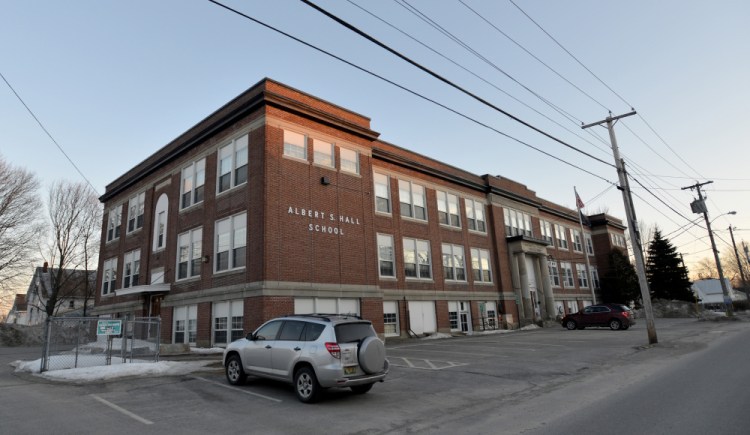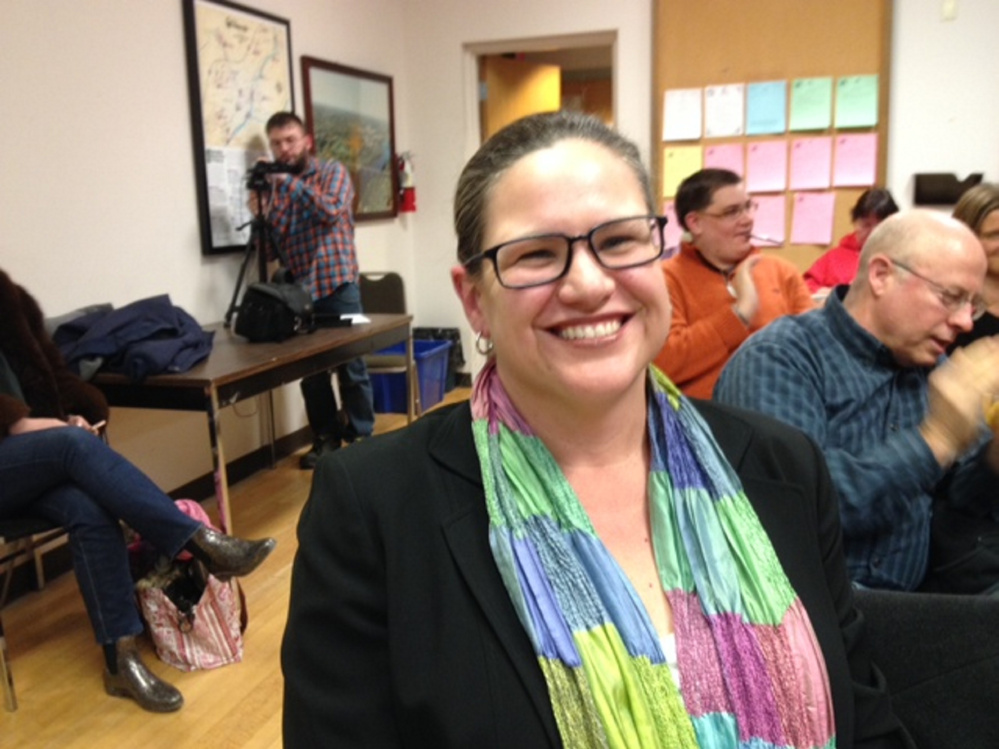WATERVILLE — School officials plan to study the feasibility of closing the historic Albert S. Hall School on Pleasant Street, in the face of declining student enrollment in the city, rising costs and scarcity of education funding.
School Superintendent Eric Haley emphasized Thursday that the decision to study the matter does not mean the school will close.
“I’m just constantly emphasizing to people a decision to close the school has not been made,” Haley said Thursday. “This a decision authorizing me to research the feasibility of it. Who knows what the decision will be?”
Haley cited numbers showing the Waterville school system has had a total enrollment decline of about 20 percent over the last 18 years.
The Waterville Board of Education on Wednesday unanimously authorized Haley to research the feasibility of closing the school, moving fourth- and fifth-grade students from there to the junior high school with sixth-graders, and move the seventh- and eighth-graders from the junior high to the high school. The board did not take an official vote on the authorization.
The Albert S. Hall School originally was known as the Pleasant Street School and was built in 1920, according to the school website. The brick building previously has served as the city’s high school and junior high school, and currently houses students in fourth and fifth grades. It was renamed the Albert S. Hall School in 1994 in honor of a longtime Waterville educator who was a teacher, principal and school superintendent.
Haley met with school principals and directors in his conference room Thursday morning to notify them of his request to the board and the board’s decision to study the feasibility of closing the school.
By afternoon, word had traveled to parents, city councilors and others about the decision. City Councilor Winifred Tate, D-Ward 6, represents the Hall School area and has a child enrolled at the school.
She expressed concern Thursday about the possibility of losing the school.
“I think we need to think collectively and seriously as a community about what the best option is for the children of Waterville and what is feasible for budget constraints,” said Tate, a new councilor. “I have talked to the administrator and teachers there. I know the amazing work that they’re doing. I think there needs to be a strategic plan developed for the city, for public education in Waterville, that really allows students to flourish and brings strategic partnerships that are part of the revitalization process.”
Tate, who is a Colby College professor, was referring to ongoing collaboration between Colby and Waterville on efforts to revitalization the downtown.
Contacted early Thursday evening, Mayor Nick Isgro said he thinks the school board made a positive step in authorizing Haley to study the issue.
“At this point, with the limited knowledge that we have, I think it’s a positive conversation,” Isgro said. “When you look at the kind of infrastructure we have compared to enrollment rates, particularly at the high school, I think it’s a positive step, looking into how we can consolidate our resources; because at the end of the day, we all recognize that, for what we’re spending, there’s a need to get more resources to the kids and the teachers in the classroom. We know we can’t follow an unsustainable model and bankrupt taxpayers.”
Isgro said he would like to see a broader discussion about regionalizing school services. He cited the Waterville and Winslow school enrollments and the resources both municipalities have and said he thinks it would be wise to form a regional team to look at regionalization possibilities.
The cost to run the Hall School for the 2016-17 school year is $1.7 million, according to Haley. Waterville has four schools, including the Hall School, which has 251 students and 23 teachers, Haley said.
There are 526 students enrolled at George J. Mitchell School at the elementary level, 377 at Waterville Junior High School and 534 at Waterville Senior High School. The total Waterville school system has 1,768 students.
That number has decreased significantly since October 1999 — about 20 percent — when there were 2,232 students. The enrollment decline has been steady: In 2007, 1,925 students were enrolled in Waterville schools; and in 2015, 1,818, according to Haley.
The costs of insurances, wages, food, utilities and other items are rising and money is tight, Haley said. He said his job as a superintendent is to be looking ahead five years.
The idea of closing schools is not a new phenomenon, he said. Waterville closed several neighborhood schools in the 1970s and 1980s and the school board in Winslow decided last year to close Winslow Junior High School after a two-year process that included forming a feasibility study committee, according to Haley, who is superintendent of Winslow and Vassalboro schools as well, as part of Alternative Organizational Structure 92.
“I’m looking five years down the road and saying, ‘Are we able to afford all the buildings we have, and do we need all the buildings we have?'” he said.
While there is enough space at Waterville Junior High for the fourth- and fifth-graders, there is not enough space at the high school to add the seventh- and eighth-graders, he said.
“We’d have to make some major changes,” he said, of the high school space.
It’s also too early to say if jobs would be cut as a result of closing a school, according to Haley.
“In Winslow we talked about this and one of the things we said is we could lose workers though natural attrition, retirements. It’s not to say it would happen, but I wouldn’t want to say that it definitely wouldn’t happen.”
Haley said schools always are dealing with a money crunch, and last season Waterville schools used $550,000 in undesignated or surplus money, as well as MaineCare support, to help fund the school budget, depleting those two funds.
“We’re already $550,000 behind before we even start budgeting,” he said. “School resources have been very scarce over the last few years, and anything we can do to streamline and be more efficient is our responsibility, as much as it hurts to think we’d lose one of our schools.”
He said superintendents must balance the quality of education — what educators need — against the community’s ability to pay.
Haley said a feasibility study team will be formed to explore the issue of closing Hall School. In a municipal school system, authorization to close a school rests with the local board of education. If a board decides to close a school, the public has 30 days in which to collect signatures — 10 percent of the number of people who voted in the last gubernatorial election — to ask that the question of closing a school be put to referendum vote.
A petition would not be possible if schools officials decide to replace the school that is closing with a new space; for instance, in Winslow, the junior high is being replaced with a new space, so there was no possibility of a petition, according to Haley.
Amy Calder — 861-9247
Twitter: @AmyCalder17
Send questions/comments to the editors.







Comments are no longer available on this story